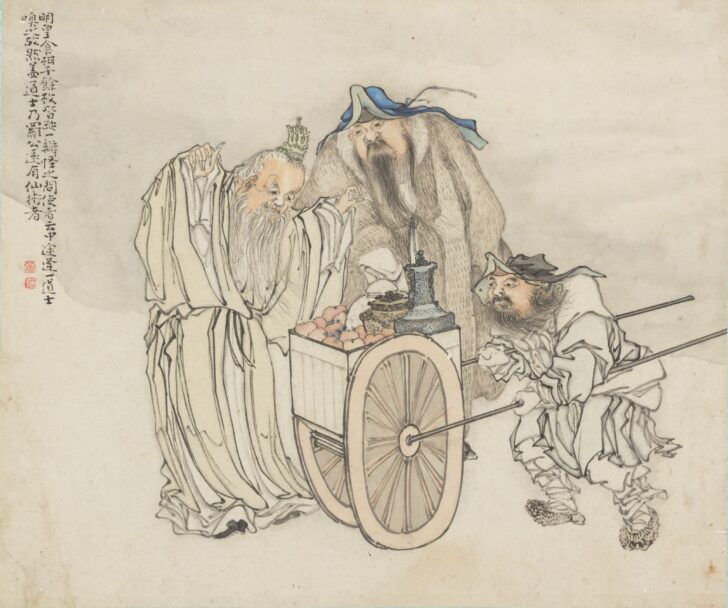Figures from Chinese History: The Taoist Luo Gongyuan
Huang Shen

Description
This album leaf is one of four from a series in the UMMA collections painted by Huang Shen. A skilled figure painter, Huang works in this series with swift, dynamic brush strokes that resemble calligraphy. His mastery of both painting and calligraphy, as well as poetry, is honored by his traditional epithet as one of the "Eight Eccentric Painters of Yangzhou" (a city in southern China). Each of the four album leaves in this series pictorializes an anecdote associated with a famous person in Chinese history. Each page includes an extensive inscription, signature, and two seals of the artist.
The figure depicted here is Zhang Tianqi, a hermit who lived during the Northern Song dynasty (960–1126) and kept two pet cranes. He would release the birds from their cages in the morning, so the birds could soar above the ravines. At dusk, the cranes always returned to the hermit. The intimate rapport between the hermit and the cranes is metaphorical, symbolizing the hermit’s deep connection with nature.
Gallery Rotation Winter 2012
Huang Shen
China, 1687–1766
left
Figures from Chinese History: The Taoist Luo Gongyuan Qing dynasty (1644–1912)
1687–1766
Album leaf, ink and color on paper
Museum purchase made possible by the Margaret Watson Parker Art Collection Fund, 1983/2.157
right
Figures from Chinese History: Zhang Tianqi Calling
in the Cranes
Qing dynasty (1644-1912)
1687–1766
Album leaf, ink and color on paper
Museum purchase made possible by the Margaret Watson Parker Art Collection Fund, 1983/2.158
These two album leaves are from a series by Huang Shen, known as one of the Eight Eccentric Painters of Yangzhou, a group of highly individualistic artists active in this prosperous metropolis in southern China. Here the artist uses his skill in detailed execution to render the accomplishments of two unique individuals.
The delightful painting on the left portrays the eighth-century magician and Daoist master Luo Gonyuan’s encounter with an imperial envoy transporting oranges and other treasures to the capital. Because he was not permitted to partake of the fruit intended for the emperor, the magician merely bent down and smelled the oranges, never laying a hand on them. When the emperor came to eat the oranges, however, he found one section was missing from each, startling evidence of Luo’s powers.
The painting on the right depicts Zhang Tianqi, a hermit who lived during the Northern Song dynasty (960–1126) and kept two pet cranes. In the morning he would release the birds from their cages to soar above the ravines and at dusk they would always return. The intimate rapport between the hermit and the cranes is emblematic of his deep connection with nature.
Subject Matter:
These two album leaves are from a series by Huang Shen, known as one of the Eight Eccentric Painters of Yangzhou, a group of highly individualistic artists active in this prosperous metropolis in southern China. Here the artist uses his skill in detailed execution to render the accomplishments of two unique individuals.
The painting on the right depicts Zhang Tianqi, a hermit who lived during the Northern Song dynasty (960–1126) and kept two pet cranes. In the morning he would release the birds from their cages to soar above the ravines and at dusk they would always return. The intimate rapport between the hermit and the cranes is emblematic of his deep connection with nature.
This is one of a set (1983/2.155, 1983/2.156, 1983/2.157, 1983/2.158).
Physical Description:
Paper mounted on aqua silk. There are two figures present, and a large crane (bird). The central figure, Zhang Tiangi, has his arms uplifted, while a less important figure is depicted with his back to the viewer and is slightly hunched over. There is a crane with a red crown behind these two figures. The colors are muted. There is calligraphy in the upper left hand corner of the painting, complete with two red seals.
Usage Rights:
If you are interested in using an image for a publication, please visit https://umma.umich.edu/request-image/ for more information and to fill out the online Image Rights and Reproductions Request Form.